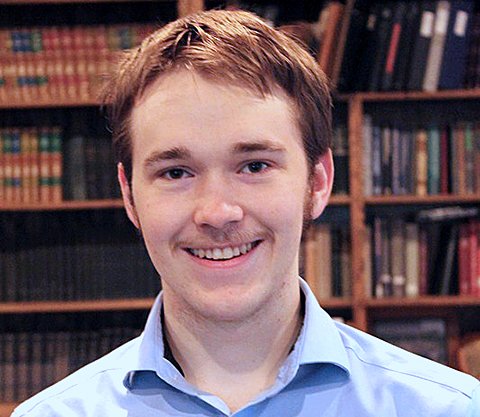Q&A with Churchill Scholar Merrick Pierson Smela

CSE graduate to spend a year at Cambridge
May 16, 2018
The Winston Churchill Foundation recently named University of Minnesota student Merrick Pierson Smela a 2018-2019 Churchill Scholar. He is one of only 15 exceptional students nationwide to earn the honor, which covers a full year’s tuition at the University of Cambridge. The award is worth about $60,000. Pierson Smela graduated this May with a degree in chemistry and biochemistry and a minor in math.
In this Q&A, Pierson Smela shares what type of research he will conduct at Cambridge, how his passion for chemistry was sparked, and the impact that scholarships have had on his academic achievements.
What sparked your interest in science?
Chemistry first attracted my interest with its “stinks and bangs” (to quote Oliver Sacks). I innately liked watching things fizz and change color. After I had done some messy experimenting with household chemicals, my parents urged me to properly learn chemistry so I could better control what I was doing. When I was in junior high and high school, I eventually put together a small lab, complete with a homebuilt fume hood and chemical storage cabinet. I also connected with other amateur scientists who shared my interests through the Sciencemadness online discussion forum.
“As I learned more about chemistry, it became clear to me that I wanted to do chemistry research at the university-level and beyond.” Pierson Smela said.
How does it feel to win this prestigious scholarship?
It’s really exciting, but also a little bit overwhelming. I honestly hadn’t been expecting to be awarded the scholarship to pursue a master’s program at Churchill College, one of the 33 colleges of the University of Cambridge. My plan after graduating from CSE this May was to go straight into a Ph.D. program. However, the overall benefits of studying abroad vastly outweigh the cost of postponing my doctoral studies, and I am looking forward to my year at Cambridge.
What type of research are you doing in Cambridge?
I will be studying in vitro oogenesis, or in other words, the method of making egg cells from stem cells in the lab. This can already be done for mouse egg cells, but various problems prevent the current method from working for human cells. My research will try to find ways around these problems. If this can be done, there would be two immediate benefits: treating infertility and bypassing ethical and technical issues surrounding the use of donated eggs for research. Over time, there would also be additional benefits to the field of human reproductive biology.
“Although I don’t anticipate singlehandedly solving the problem of in vitro human oogenesis,” Pierson Smela said. “I do think that I can make a substantial contribution to this important topic.”
What excites you the most about studying abroad in England?
I’m most excited to begin my research project and help make a difference in the field of human reproductive biology. So far, my research background has mainly been in chemistry. This opportunity to pursue a master of philosophy (MPhil) degree in biological science will allow me to try something completely different. Additionally, I’m looking forward to meeting people from different cultures and making new friends.
What will you miss about the College of Science and Engineering or the University of Minnesota?
Mainly, I will miss all my friends on campus and the professors who have mentored me.
You’ve received a few other scholarships during your time at the U, including the Bentson Family and Cyrus and Mary Field Scholarships. What impact did those have on you?
I am very grateful for them because they have allowed me to fully focus on academics without worrying about finances. One in particular that has meant a lot to me is the Astronaut Scholarship. Besides financial support, it provided a trip to Washington D.C. that sparked me to think about how science can benefit the United States and the world.
What advice do you have for incoming students?
My advice is to:
- Get to know your professors.
- Get involved in research opportunities, such as the Undergraduate Research Opportunities Program (UROP).
- Join a student group, but don’t join too many!
- Develop efficient study habits.
And remember, nobody can be perfect at everything—but most people have the capacity to excel in at least one thing. You should figure out what that thing is for you.
Interview by Sabrina Cynova.
If you’d like to support University of Minnesota College of Science and Engineering students, visit our CSE Giving website.
